Student Innovators to Watch
April 25, 2024
UNT students are learning firsthand how their innovation can impact a range of fields from art and science to education and cybersecurity.
Improving Food Safety
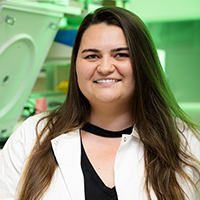 Sydney Schoellhorn, a chemistry doctoral student, is investigating a fungal endophyte
known as Sarocladium zeae that grows naturally on corn. It appears to shield corn from other fungal pathogens that secrete mycotoxins. Schoellhorn
is studying the behavior of the fungus independent of its corn host to get a better
understanding of its genetic blueprint, which could have huge implications for food safety and preventing
food spoilage.
Sydney Schoellhorn, a chemistry doctoral student, is investigating a fungal endophyte
known as Sarocladium zeae that grows naturally on corn. It appears to shield corn from other fungal pathogens that secrete mycotoxins. Schoellhorn
is studying the behavior of the fungus independent of its corn host to get a better
understanding of its genetic blueprint, which could have huge implications for food safety and preventing
food spoilage.
Her research is supported by a $180,000 predoctoral fellowship through the U.S. Department of Agriculture’s National Institute of Food and Agriculture. Schoellhorn is the first UNT student to earn this type of USDA fellowship, which focuses on agricultural-based research.
Podcasts as a Learning Tool
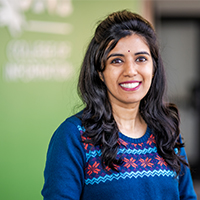 Durga Srikari, a master’s student in information science and a cybersecurity professional,
is exploring whether podcasts may be an ideal learning resource for high school students,
many of whom have used smartphones or tablets from a young age. In an increasingly
technology-driven world, basic cybersecurity training will be an essential addition
to curricula, Srikari says.
Durga Srikari, a master’s student in information science and a cybersecurity professional,
is exploring whether podcasts may be an ideal learning resource for high school students,
many of whom have used smartphones or tablets from a young age. In an increasingly
technology-driven world, basic cybersecurity training will be an essential addition
to curricula, Srikari says.
She’s working alongside UNT associate professor of information science Gahangir Hossain to learn whether a podcast could be an effective medium for educating students on cybersecurity standards and practices. She’s already using the medium as a learning tool through her own podcast, Cyber Trooper, which provides updates on advancements in the field.
Efficient Computing
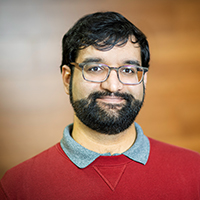 Ali Khan (’21), a Ph.D. student in computer science and engineering, earned a Graduate
Research Fellowship from the U.S. National Science Foundation in 2023 for his study
on the union of machine learning, high performance computing and graph theory. His
research centers on developing scalable neurosymbolic algorithms for network comparison.
Specifically, he looks at how to quickly troubleshoot problems with software that
scientists use on supercomputers.
Ali Khan (’21), a Ph.D. student in computer science and engineering, earned a Graduate
Research Fellowship from the U.S. National Science Foundation in 2023 for his study
on the union of machine learning, high performance computing and graph theory. His
research centers on developing scalable neurosymbolic algorithms for network comparison.
Specifically, he looks at how to quickly troubleshoot problems with software that
scientists use on supercomputers.
Previously, Khan helped researchers from UNT’s Center for Computational Epidemiology and Response Analysis in their development of RE-PLAN — a cloud-based computer program to help health care officials plan emergency responses for disease outbreaks.
Understanding Nutrition
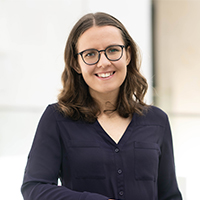 Kaetlin Marsh, an Honors College psychology major with minors in history and biological
sciences, has been interested in studying health guidelines and their dissemination
since she first discovered the ambiguity of nutrition and exercise recommendations
during her own search on healthy habits.
Kaetlin Marsh, an Honors College psychology major with minors in history and biological
sciences, has been interested in studying health guidelines and their dissemination
since she first discovered the ambiguity of nutrition and exercise recommendations
during her own search on healthy habits.
At UNT, she’s used that experience to drive her interdisciplinary research including examining the effects social factors like body talk can have on exercise motivation and body image distress in women. In the future, Marsh plans to further her education in clinical health psychology with a goal to use that knowledge to educate diverse communities about positive weight-related behaviors.
Accessing Nature
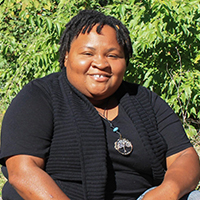 Krystal Toney, an environmental science doctoral student, has gained a deeper knowledge
of nature’s interconnectedness while also discovering that access to nature isn’t
always equitable. She is researching the disparities in access to conservation education
and nature among Black and low socioeconomic students.
Krystal Toney, an environmental science doctoral student, has gained a deeper knowledge
of nature’s interconnectedness while also discovering that access to nature isn’t
always equitable. She is researching the disparities in access to conservation education
and nature among Black and low socioeconomic students.
Through her blog Black in Nature, Toney sheds light on inequity and quells the misconception that Black people aren’t doing environmental work. Her efforts to elevate Black voices have led to speaking engagements and two children’s books about bugs. During her time at UNT, Toney has worked with the Dallas Environmental Education Initiative. She hopes to land a full-time job in environmental science in the future.
Immersive Art
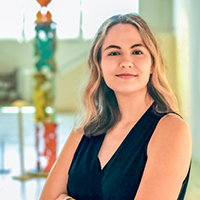 For Julia Caswell Freund, a new media art master’s student, research is like excavation
— one day she’s digging through primary texts and the next she’s curating artifacts
from Ray Roberts Lake State Park. Freund creates immersive, multidisciplinary art
experiences that invite viewers to reflect on their relationship to knowledge systems
and the ever-changing world.
For Julia Caswell Freund, a new media art master’s student, research is like excavation
— one day she’s digging through primary texts and the next she’s curating artifacts
from Ray Roberts Lake State Park. Freund creates immersive, multidisciplinary art
experiences that invite viewers to reflect on their relationship to knowledge systems
and the ever-changing world.
As a student in Art and the Environment, a special topics course led by University Distinguished Research Professor Dornith Doherty, Freund created a multimedia installation and coinciding live performance in the UNT Elm Fork Education Center inspired by archeological research and North Texas history. Her next project will explore her family’s history in South Texas.
Cultivating Resilience
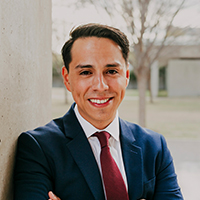 Bernardo Vargas, a Ph.D. candidate in philosophy, is studying race and environmental
justice for Latinx communities as part of the Crossing Latinidades Mellon Humanities Fellowship and its Climate and Environmental Justice
Humanities Research Working Group. Specifically, Vargas is observing how climate change
impacts low-income Latinx communities in Chicago, Los Angeles and the Dallas-Fort
Worth area as well as what strategies these communities use to adapt to it.
Bernardo Vargas, a Ph.D. candidate in philosophy, is studying race and environmental
justice for Latinx communities as part of the Crossing Latinidades Mellon Humanities Fellowship and its Climate and Environmental Justice
Humanities Research Working Group. Specifically, Vargas is observing how climate change
impacts low-income Latinx communities in Chicago, Los Angeles and the Dallas-Fort
Worth area as well as what strategies these communities use to adapt to it.
His prior study on the resilience of individuals inhabiting informal housing and their utilization of joy and coping strategies from the Global South earned first place in a student research contest hosted by UNT’s Advanced Environmental Research Institute.
Exploring Books on Grief
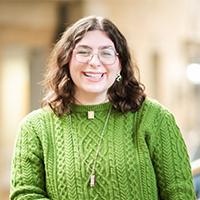 Daphne Lynd, an undergraduate student in early childhood education, is studying how
children’s books on grief, loss and death can help children feel understood, centered and that their emotions are validated. Lynd always knew she wanted to be
a librarian, but her research with Anondah Saide, assistant professor of educational
psychology, has motivated her to focus on ways she can bridge communities and raise
awareness around dealing with grief and loss for children and families.
Daphne Lynd, an undergraduate student in early childhood education, is studying how
children’s books on grief, loss and death can help children feel understood, centered and that their emotions are validated. Lynd always knew she wanted to be
a librarian, but her research with Anondah Saide, assistant professor of educational
psychology, has motivated her to focus on ways she can bridge communities and raise
awareness around dealing with grief and loss for children and families.
Lynd plans to engage the scholarly community in discussing how these books work within early childhood development and the necessity to make this literature more accessible as print and e-books for communities at large.
Affordable Health Care
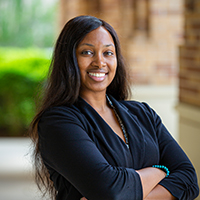 Chandler Cook (’21), a dual master’s student in biomedical engineering and management,
is passionate about helping people. Her research focuses on developing affordable
biomedical implants, prosthetics and medical devices for low-income communities. Cook’s
3D bioprinting work with associate professor of biomedical engineering Moo-Yeal Lee
helped solidify her passion, allowing her the perfect blend of in-class learning and
hands-on lab experience.
Chandler Cook (’21), a dual master’s student in biomedical engineering and management,
is passionate about helping people. Her research focuses on developing affordable
biomedical implants, prosthetics and medical devices for low-income communities. Cook’s
3D bioprinting work with associate professor of biomedical engineering Moo-Yeal Lee
helped solidify her passion, allowing her the perfect blend of in-class learning and
hands-on lab experience.
She has interned with the UNT Health Science Center and Abbott Laboratories, serving as the liaison to connect the diagnostic company with students seeking opportunities in the biomedical field. Cook plans to start her own biomedical engineering company to catalyze kindness in health care.
Fictional Languages
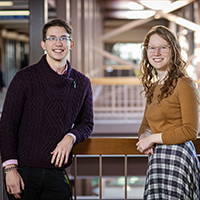 Analiese Beeler and Carter Smith, undergraduate linguistics majors, are using computational
methods and statistical monitoring to compare constructed languages, such as Dothraki
in Game of Thrones, with natural languages that evolved over millennia. Their research explores humans’
innate understanding of language and how it’s unconsciously applied. They also hope
to draw more interest in linguistics through connecting with popular culture.
Analiese Beeler and Carter Smith, undergraduate linguistics majors, are using computational
methods and statistical monitoring to compare constructed languages, such as Dothraki
in Game of Thrones, with natural languages that evolved over millennia. Their research explores humans’
innate understanding of language and how it’s unconsciously applied. They also hope
to draw more interest in linguistics through connecting with popular culture.
The DFW Metroplex Linguistics Conference accepted their work for presentation. Smith looks forward to pursuing graduate studies in computational linguistics and staying involved in research. Beeler is taking a gap year to work as a proofreader and editor while she considers which way her passions will lead her.